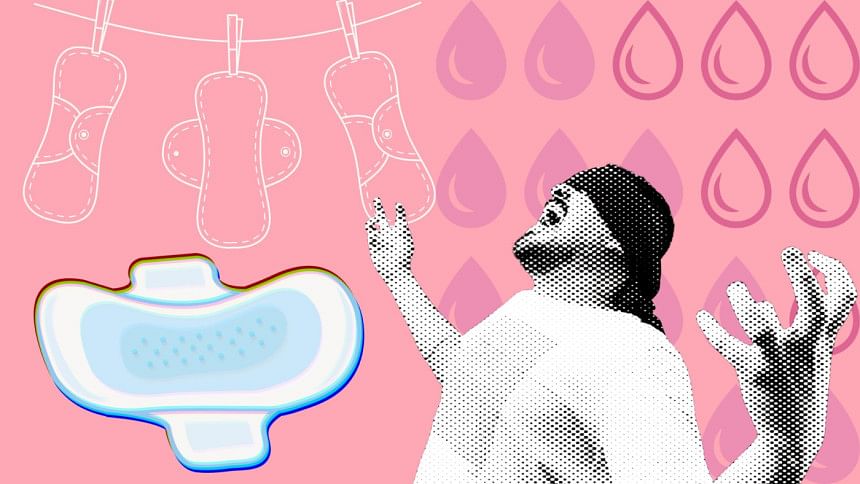
Last update on: Thu Feb 20, 2025 08:10 AM

Let us try to not get into the specifics of whether sanitary napkins were being sold or distributed at the country’s largest annual book fair—the Ekushey Boi Mela. Let’s not even point fingers at the event management company or the Bangla Academy for allowing, and later, stopping the stalls to do so. The unsettling fact that surpassed these issues is that a group of men had a problem with the public display of such “private” product— sanitary napkins.
In this context, I couldn’t help but look back at a chapter titled “The Curse” from a superhero series named Swamp Thing, published by DC Comics. In this chapter, we are presented with a white female protagonist named Phoebe who is haunted by the spirits of menstruating women from the fictitious Native American “Pennamaquot” tribe. Those women were ostracised and quarantined in “the red lodge” that once stood in the plot of land, now occupied by Phoebe and her husband, Roy.
Phoebe’s rage is fuelled by the condescending way her misogynistic husband—an epitome of toxic or hyper masculinity, treats her. Phoebe is also infuriated by the stifling patriarchy that is too ingrained in the system and sometimes propagated by women themselves—women who have internalised patriarchy. For example, at the supermarket, Phoebe buys a large box of sanitary napkins that the checkout lady hides in a brown bag “as if to protect other groceries.” This evidences the latter’s role in the patriarchal tool of making menstruation and menstruation products taboo.
Needless to say, this is also the norm in pharmacies and shops or supermarkets that sell sanitary napkins in Bangladesh. The need to hide the period product from the male gaze is similar to hiding Pennamaquot menstruating women from the rest of the tribe, which in turn, is similar to the demands of the group of men, who want to keep the sanitary napkins out of sight at the book fair. Menstruation, at the end of the day, in both so-called “civilised” and “uncivilised” societies, in the past and at present, is seen as something to be ashamed of because it is associated with undesirability and grossness.
Why should one be so vehemently against period products being openly displayed, when these very products ensure the physical and mental wellness of women while their uterus sheds its lining during every menstrual cycle—a completely natural bodily function? Many girls and women in Bangladesh do not have access to period products due to financial constraints and lack of awareness and resort to using rags and unhygienic products that may lead to discomfort, skin issues, various kinds of infections, diseases, cervical cancer, absenteeism at school or workplace, low self-esteem, and overall, poor quality of life.
Some men have even gone on to claim that women in past generations never used sanitary napkins and they were healthy women, so what is the need for such a product now? This argument falls under two types of logical fallacies. First, the false equivalence fallacy, which compares two situations—past generations who did not use sanitary napkins and current generations who are encouraged to do so, as if they are the same, ignoring critical differences such as advancements in hygiene, healthcare, and changes in lifestyle. Just because women in the past managed without sanitary products does not mean it was ideal or healthy. It’s like saying, my grandfather smoked his entire life and lived up to the ripe old age of 90, so smoking can’t be that bad for your health—a comparison that uses an anecdote ignoring scientific evidence that links smoking to cancer, heart disease and early mortality.
Second, the appeal to tradition fallacy, which assumes that because something was done a certain way in the past, it should be continued in the same way. It suggests that traditional practices are inherently better without considering improvements or the problems that those practices used to cause. It’s like saying, we have always used home remedies for illnesses in our family, so there’s no need for modern medicine, which assumes a tradition or practice is better or correct simply because it has been done for a long time, while disregarding advancements in medical science that could offer effective treatments.
It is men who stood in unison to put an end to the public display of sanitary napkins, yet they remain conspicuously absent from efforts to combat violent crimes against women. Where do men gather to voice their protestations when children, disabled, and elderly women are violently abused, raped and murdered? When there’s hardly any hue and cry as far as gender-based violence is concerned, there is a terrorising frat party or congregation of conservative men who are uncompromisingly opposed to the idea of ensuring that women at a book fair can get easy access to sanitary napkins if they happen to bleed there. Do they expect us, women, to dislodge our private parts and leave them under lock and key, in a sealed safe, buried six feet under, in some impenetrable forest, when we go out?
What if this same energy that was exhibited by sanitary-napkin-hating men was channelled into advocating for women’s safety, dignity, and access to essential products? How different could our society be if those voices rallied for progress instead of suppression?
Noora Shamsi Bahar is senior lecturer at the Department of English and Modern Languages, North South University (NSU), and a published researcher and translator.
Views expressed in this article are the author’s own.
Follow The Daily Star Opinion on Facebook for the latest opinions, commentaries, and analyses by experts and professionals. To contribute your article or letter to The Daily Star Opinion, see our guidelines for submission.









